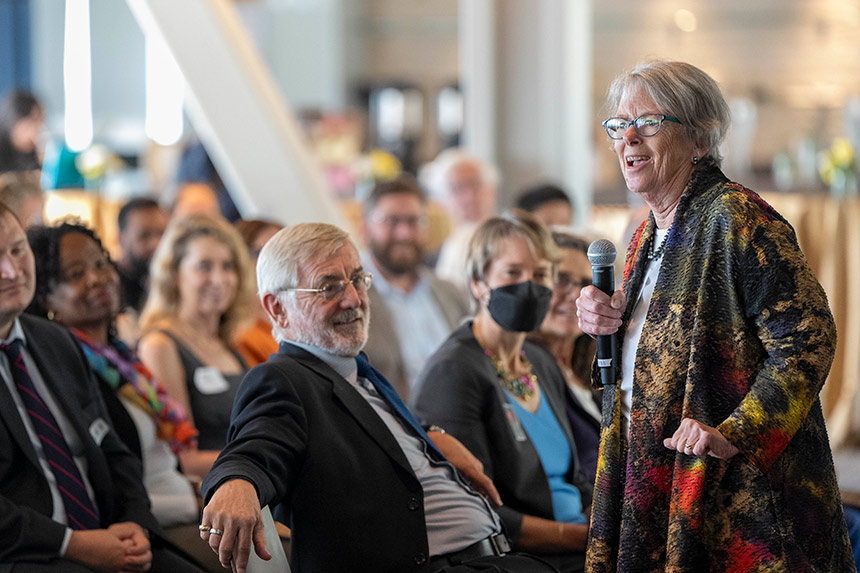
By Andrew Cohen
Conferences honoring a renowned legal scholar are almost always reserved for someone retiring, as a way to honor their life’s work. It seems those who recently feted Berkeley Law Professor Pamela Samuelson realized waiting that long would demand more than a full-day event.
Top scholars from around the world hailed Samuelson as a trailblazing titan in digital copyright law, intellectual property, cyberlaw, and information policy. They also described how her seismic impact in those fields, remarkably, is surpassed by her impact on the people working in them.
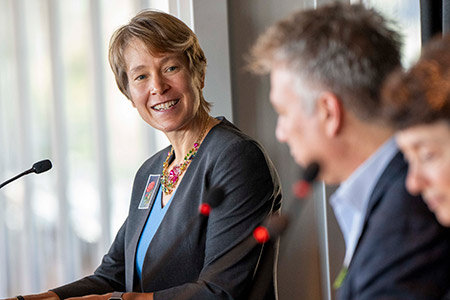
“I haven’t seen an academic event where so many people speak from the heart,” said Vanderbilt Law Professor Daniel Gervais, director of the school’s Intellectual Property Program. “That’s very telling about Pam and the person she is.”
A MacArthur “genius grant” recipient among her many honors, Samuelson was praised for insightful and incisive scholarship, honest feedback and relentless support for fellow scholars, an uncanny ability to untangle complex legal issues, and a commitment to exploring how such issues affect the public.
Discussing copyright reform, author’s rights, internet activism, innovation, and other areas of Samuelson’s expertise, peers also thanked her for cultivating a warm, collaborative culture within the intellectual property scholarship community.
Panelists also widely noted her precision and clarity as a writer, no matter how complex the subject. Every year, Georgetown Law Professor Julie Cohen gives her class members Samuelson’s list of essentials for student writing. “The first thing in it is to have a point and get to the point,” Cohen said.
“How much Pam has meant to this law school and this university can’t be overstated,” Berkeley Law Dean Erwin Chemerinsky said. “She was a key figure in creating our Berkeley Center for Law & Technology (BCLT), her generosity created our Samuelson Law, Technology & Public Policy Clinic, and she’s been a leader on many university committees.”
Held in Memorial Stadium’s picturesque University Club, the event was presented by BCLT, emceed by Professor Molly Van Houweling, and coordinated by center staff members Richard Fisk and Abril Delgado, who spent months organizing the event.
“It was heartwarming to be appreciated not just for the work I’ve done over the years, but also for mentoring students and junior colleagues,” Samuelson said. “Nothing makes me happier than knowing about their successes.”
Copyright law concerns
Throughout the day, panels discussed the main areas of Samuelson’s work, the pivotal issues it tackles, and the ways in which she has shaped them. In a video tribute preceding a panel titled “Mapping Copyright,” Tel Aviv University Professor Niva Elkin-Koren highlighted the prescient way she studied the interface of copyright law and contract law.
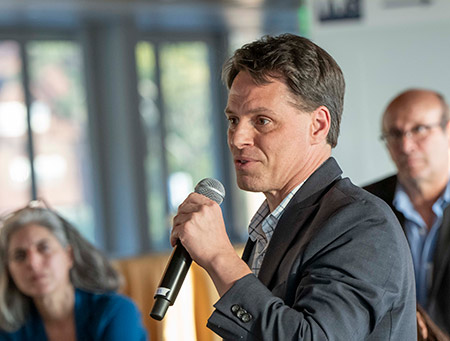
“Pam was a pioneer in identifying the mismatch between copyright law and our digital transformation,” Elkin-Koren said. “In the 80s, while mainstream policy makers called for strengthening copyright protection, she argued copyright protection might actually be inappropriate for software utilitarian work.”
Panelists explained how Samuelson was among the first to articulate the significance of digital advancements — and to warn that leaving copyright discretion solely to rights holders might undermine public policy.
Cohen credited Samuelson for clearly unpacking what the public domain entailed, highlighting a 2003 paper that she said identified core areas, territories a doctrinal purist would not have thought to include, and a workable framework for understanding, preserving, and safeguarding the public’s access to information.
Michigan Law Professor and Berkeley Law alum Aaron Perzanowski ’06 commended her for arguing “persuasively and early” that copyright was an inappropriate fit for software.
“She called for more tailored protections and stressed the importance of limiting protection for utilitarian processes, explaining how protecting utilitarian aspects of a work or device was a major departure from long-standing copyright policy,” he said.
Moving the needle
Berkeley Law Professor Sonia Katyal admired Samuelson’s role in balancing private intellectual property law frameworks with forgotten public law principles through a “groundbreaking skill set” focused on meticulously leveling values. Even with the increasingly thorny advances of artificial intelligence, Katyal shared how Samuelson continually provides a clear map and sound architecture for AI analysis based on transparency, explainability, and accountability.
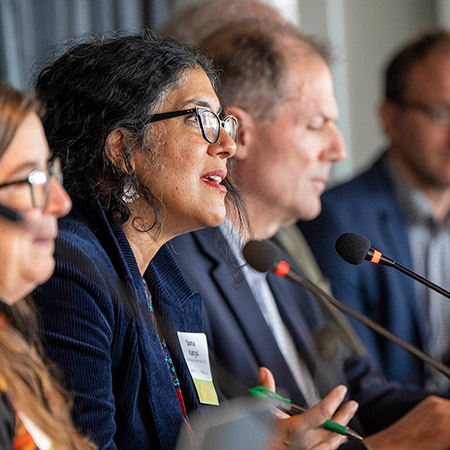
“There’s always a thread in her work that quietly and calmly tries to bring doctrines and principles in balance with one another,” she said.
Georgetown Law Professor Kristelia García described how Samuelson clarified key misunderstandings about software and why it doesn’t merit copyright protection. She said her commentary following the highly publicized Google v. Oracle case had become essential reading for law students and powerfully showed how to keep copyright out of patent law.
“In a field where academics are under pressure to declare copyright as something good or something bad, Pam showed that copyright is fine so long as it stays in its lane,” García said. “Copyright has a tendency to take what’s given and ask for more, and no one has done more to slap back that grubby little hand than Pam. She calls out copyright overreach wherever she finds it, and boy does she find it.”
Digital librarian and computer engineer Brewster Kahle, who invented the internet’s first publishing and distributed search system and co-founded Alexa Internet, didn’t mince words regarding the impact of Samuelson’s push to make information accessible to all.
“Thank you for the internet we know and use,” he said. “Thank you for the internet that let everyone in, an internet that has many winners, not just a few. It’s not clear that was going to happen, and in the 80s I knew a number of people who said, ‘You can’t do that, they’re not going to allow it.’”
Keynote speaker and U.S. Second Circuit Court of Appeals Judge Pierre Laval, discussing the recent Supreme Court case Warhol Foundation v. Goldsmith and Samuelson’s keen insights about it, said she “is much like Yosemite National Park: a national treasure.”
Dedicated mentor
Perzanowski met Samuelson as a first-year law student 20 years ago. He had a fascination, “if not a particularly informed one,” with copyright law, and Samuelson’s reputation and clinic were key factors in his decision to enroll.
“I had no real professional goals, I wasn’t sure I wanted to be a lawyer, and I’d never given thought to being a law professor,” he said. “I was a kid from rural Appalachia with a ridiculous haircut and a bunch of tattoos that would have been regrettable for a person capable of regret. Despite all that, Pam took me seriously in her courses.
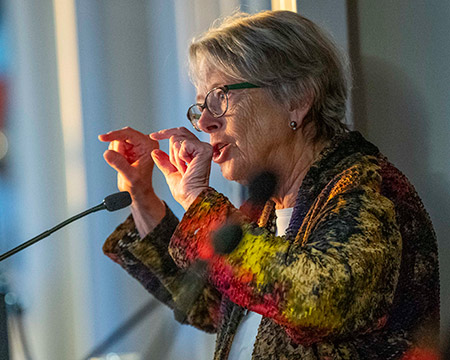
“As we worked together on briefs and as I did my own initial academic writing, she treated me like a person who might have something interesting or useful to contribute. That was instrumental for me … I really needed that endorsement from someone I respected and admired before I could honestly recognize my own ambition, let alone say it out loud. I’m most grateful to Pam for validating me as a person whose ideas might matter.”
Echoing the sentiments of many in the room, Katyal said Samuelson “is always taking interest in me and my work, celebrating work of junior colleagues, and weaving empathy through creative problem solving.” She added that her kindness is ever-present, and that she regularly sent photos of birds, flowers, plants, and sunsets to help Katyal through difficult times.
Cohen recalled her first job talk at the University of Pittsburgh School of Law in 1994, when Samuelson taught there. Even though she had some criticisms of Samuelson’s work, Cohen said she “treated me with open arms” and has supported her own work ever since — reviewing article drafts, recommending her for symposia, inviting her to working groups, and “modeling the engaged, collegial academic citizenship and wise, generous mentorship we should all aspire to.”
The Berkeley Technology Law Journal will publish an issue about the conference. Journal Symposium Editor Nicole Boucher ’25 called Samuelson a kind, caring, and gifted educator who has enriched generations of students.
“Thank you for all you bring to Berkeley Law as a professor, mentor, and creator,” she said.